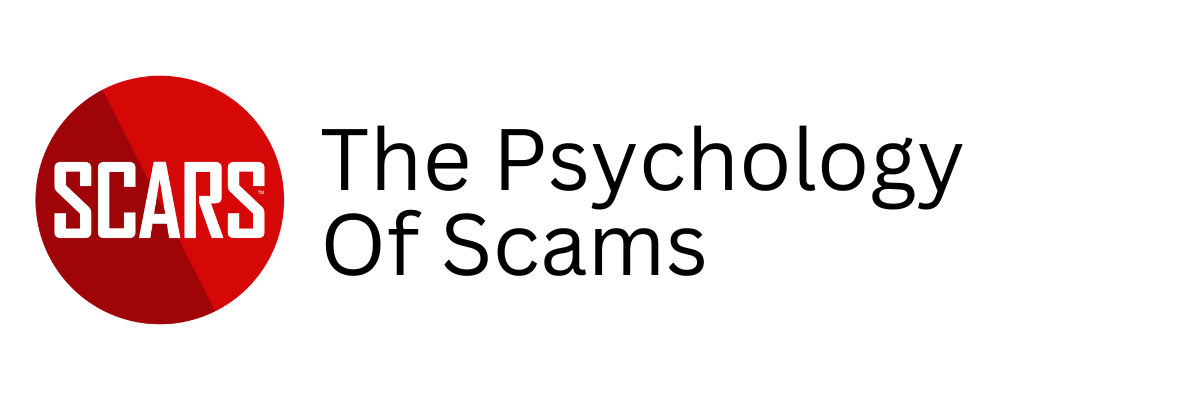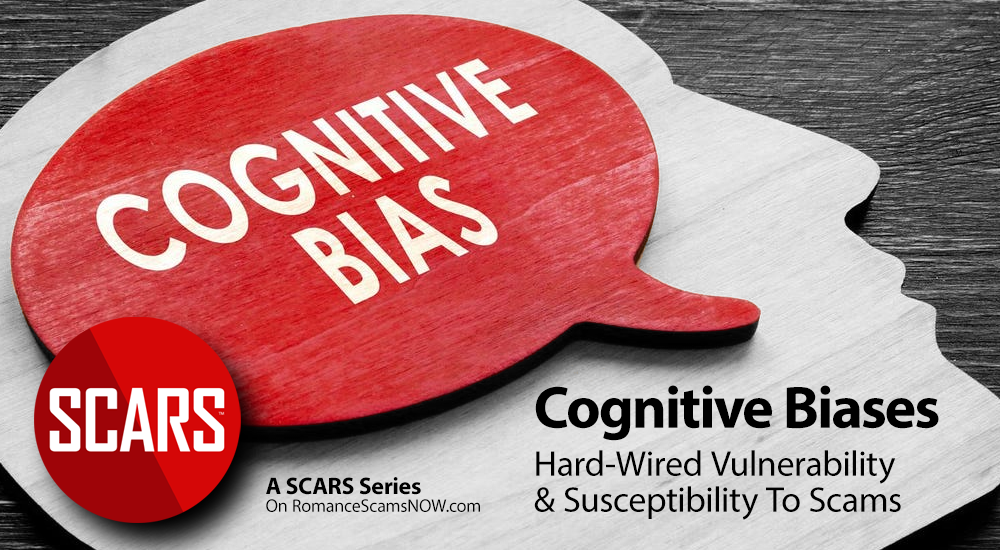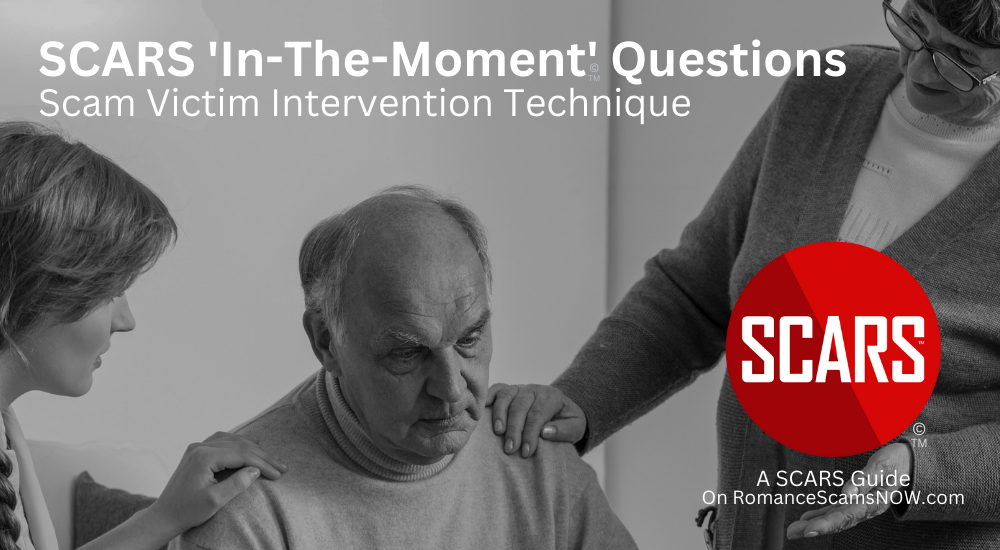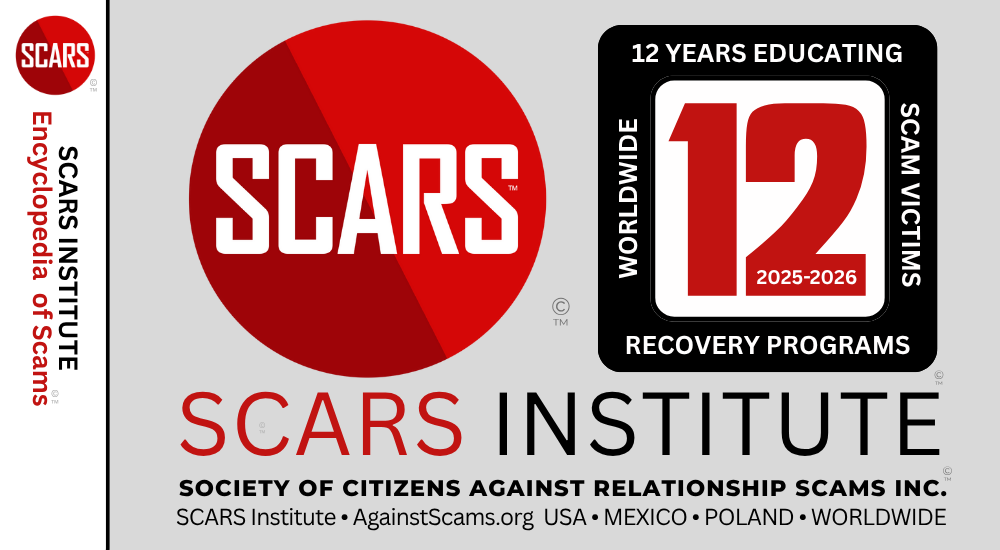
SCARS Institute’s Encyclopedia of Scams™ Published Continuously for 25 Years

Authors:
• Vianey Gonzalez B.Sc(Psych) – Psychologist, Certified Deception Professional, Psychology Advisory Panel & Director of the Society of Citizens Against Relationship Scams Inc.
• Tim McGuinness, Ph.D., DFin, MCPO, MAnth – Anthropologist, Scientist, Director of the Society of Citizens Against Relationship Scams Inc.
Article Abstract
The SCARS “In-The-Moment” Questions intervention technique is a targeted approach aimed at empowering scam victims to challenge the authority and credibility of scammers during a scam attempt. By asking concise and relevant questions designed to provoke critical thinking and instill doubt in the victim’s mind, this technique disrupts cognitive biases, such as authority bias, and prompts victims to make more informed decisions.
Drawing from principles of cognitive psychology and therapeutic approaches like mindfulness and cognitive-behavioral therapy (CBT), SCARS professionals have adapted this technique for use in scam prevention and victim support. The technique can be applied by families, businesses, or financial institutions to help victims break free from the scammer’s control, instill doubts about the legitimacy of the scam, and ultimately protect themselves from financial loss and emotional harm.
Key elements of the technique include careful timing and preparation, clear and concise questioning, fostering skepticism, and providing reassurance and support throughout the intervention process. Both verbal and written responses can be effective, depending on the victim’s preferences and the specific context of the scam situation. By prompting victims to engage in critical thinking and challenging assumptions in real-time, the “In-The-Moment” Questions intervention technique equips individuals with the tools to recognize and resist scams, ultimately enhancing their financial security and well-being.

Introducing the SCARS ‘In-The-Moment’ Questions Scam Victim Intervention Technique to Help Them Break Free of the Scammer’s Control
What is the ‘In-The-Moment’ Questions Intervention Technique?
The “In The Moment” Questions intervention technique involves asking targeted questions designed to provoke critical thinking and instill doubt in scam victims during a scam attempt. This technique aims to disrupt cognitive biases, such as authority bias, and empower individuals to make more informed decisions.
The concept of asking questions to help individuals focus on the present moment and gain awareness of their thoughts, feelings, and surroundings is not novel and has been used in various therapeutic approaches like mindfulness and cognitive-behavioral therapy (CBT) for years.
The SCARS professionals have adapted this technique for use in the field of scam prevention and victim support.
What is it Good For?
The SCARS ‘In-The-Moment’ question intervention technique can be used to help any scam victims trapped under the control of the scammers/criminals.
It can be used by families to help a scam victim in denial to see a glimmer of truth and begin to doubt what they were told by the scammers.
It can be used by banks, financial institutions, or businesses to help break the control that the victim is under, or at least instill doubts about what they believed or were told.
The Psychology Behind It
The psychology behind the use of “In The Moment” scam victim intervention questions lies in disrupting cognitive biases, particularly authority bias, and prompting critical thinking in individuals who are being targeted by scammers. The Authority bias is one of the hundreds of cognitive biases where individuals tend to attribute greater credibility and trustworthiness to perceived authority figures, creating fertile ground for scammers to exploit. By implementing prompts that provoke doubt and encourage skepticism in real-time during a scam attempt, this technique interrupts the automatic compliance driven by authority bias and many other biases as well.
These prompts work by engaging the victim’s cognitive processes, particularly those related to decision-making and rationality. When individuals encounter conflicting information or cues that challenge their existing beliefs or assumptions, it triggers a state of cognitive dissonance. This discomfort prompts individuals to reevaluate their perceptions and beliefs, leading to increased scrutiny and critical analysis of the situation.
In the context of scam victim intervention, the “In The Moment” questions serve as cognitive disruptors, creating a pause in the victim’s thought process and prompting them to reassess the legitimacy of the interaction. By introducing doubt and encouraging reflection, these prompts empower victims to question the authority and credibility of the scammer, ultimately reducing the likelihood of falling victim to the scam.
To apply this technique effectively, it’s essential to design prompts (questions) that are concise, clear, and relevant to the specific context of the scam. These prompts should challenge the legitimacy of the scammer’s claims or requests, highlight potential red flags or inconsistencies, and encourage the victim to verify information through trusted channels – see examples below. Additionally, leveraging technology, such as banking apps or automated messaging systems, or even families or business employees, can enhance the delivery and impact of these prompts by providing real-time support and guidance to victims.
In the brain, this intervention triggers a shift in cognitive processing, moving individuals from automatic, reflexive responses driven by authority bias to more deliberate, analytical thinking. Regions of the brain associated with decision-making, such as the prefrontal cortex, become more active as individuals engage in critical evaluation and reasoning. This cognitive engagement facilitates a moment of clarity for the victim, allowing them to recognize the manipulation and control tactics employed by the scammer and take appropriate action to protect themselves. More on this below.
Overall, the use of “In The Moment” scam victim intervention questions leverages principles of cognitive psychology to disrupt automatic responses driven by authority bias and empower victims to make more informed decisions in the face of deception and manipulation. By prompting critical thinking and instilling doubt, this technique equips individuals with the tools to recognize and resist scams, ultimately enhancing their financial security and well-being.
Other Cognitive Biases
What other cognitive biases can be overcome using the In The Moment questions intervention technique?
The SCARS ‘In The Moment’ questions intervention technique can be effective in addressing various cognitive biases beyond authority bias. Here are some examples:
- Confirmation Bias: This bias involves seeking out information that confirms pre-existing beliefs while ignoring evidence that contradicts them. In-the-moment questions can prompt individuals to consider alternative perspectives or seek out additional information that challenges their assumptions, helping to mitigate confirmation bias.
- Anchoring Bias: Anchoring bias occurs when individuals rely too heavily on initial information or “anchors” when making decisions, even when that information is irrelevant or misleading. By introducing prompts that encourage individuals to reassess their initial assumptions or judgments, the intervention can help mitigate the influence of anchoring bias and promote more flexible decision-making.
- Availability Heuristic: This bias involves overestimating the likelihood of events based on their ease of recall from memory. In-the-moment questions can prompt individuals to consider the actual probability or likelihood of a particular event, rather than relying solely on the salience or vividness of available information.
- Recency Bias: Recency bias occurs when individuals give more weight to recent events or information when making decisions, while discounting older or less recent information. By prompting individuals to consider a broader range of information or experiences, in-the-moment questions can help mitigate the influence of recency bias and promote more balanced decision-making.
- Overconfidence Bias: This bias involves overestimating one’s own abilities or knowledge, leading to unwarranted confidence in decision-making. In-the-moment questions can prompt individuals to reflect on the basis of their confidence or certainty, encouraging them to consider potential gaps in their understanding or areas of uncertainty.
- Sunk Cost Fallacy: Sunk cost fallacy occurs when individuals continue to invest resources (such as time, money, or effort) in a decision or course of action, even when it is no longer rational to do so because they have already invested so much. In-the-moment questions can prompt individuals to reassess their priorities and consider whether continuing to invest resources is truly justified based on current circumstances.
- And many other biases!
The “In The Moment” questions intervention technique can be a versatile tool for addressing a range of cognitive biases, manipulative techniques, and control mechanisms by prompting individuals to engage in critical thinking, challenge assumptions, and consider alternative perspectives in real-time decision-making situations. By promoting more reflective and evidence-based decision-making, this intervention can help individuals overcome biases and make more informed choices.
Countering Gaslighting
The ‘in the moment’ questions intervention technique be useful in countering the gaslighting manipulation technique as well.
Gaslighting involves manipulating someone into questioning their core beliefs – their perception, memory, or sanity, often leading to self-doubt and dependence on the manipulator. By asking targeted questions that prompt critical thinking and encourage the victim to trust their own judgment, the intervention technique can help counteract the effects of gaslighting.
For example, if a victim of gaslighting is made to doubt their memory or experiences, an intervener could ask questions that prompt the victim to recall specific details or events objectively. These questions may help the victim reaffirm their own reality and challenge the gaslighter’s attempts to distort it.
Additionally, the intervention technique can empower victims to recognize manipulation tactics, identify patterns of behavior indicative of gaslighting, and assert boundaries with the gaslighter. By fostering self-awareness and promoting assertiveness, the technique equips individuals with the tools to resist manipulation and maintain their autonomy.
Using the ‘In-The-Moment’ Questions Intervention Technique
Here is a step-by-step tutorial on how someone can intervene with a scam victim using the SCARS in-the-moment questions. Such as how many questions, and how long between each question. How the scam victim should respond for maximum effectiveness and more.
Intervening with a scam victim using “In The Moment” questions requires careful consideration of timing, wording, and delivery to maximize effectiveness. Here’s a detailed step-by-step tutorial:
- Timing and Preparation:
- Ensure that the intervention occurs during the scam attempt, ideally while the victim is engaged with the scammer but before any critical actions are taken to end it.
- Prepare a set of concise and relevant questions designed to provoke critical thinking and instill doubt in the victim’s mind – see below for examples.
- Practice delivering the questions in a clear and calm manner to avoid escalating the situation or causing undue distress to the victim.
- Initial Engagement:
- Begin by establishing communication with the victim, either through a messaging platform, phone call, or in-person interaction, depending on the context of the scam and the availability of the scam victim.
- Express concern for the victim’s well-being and emphasize that you are there to help and support them.
- Prompting the Victim:
- Introduce the first SCARS “In The Moment” question in a non-threatening and non-judgmental manner. For example, “Can you confirm if you were expecting this call ‘him’ after you did this?”
- Allow the victim a moment to process the question and respond. Encourage them to consider the legitimacy of the situation and any potential red flags.
- Depending on the victim’s response and the specific circumstances of the scam, follow up with additional questions that further probe the legitimacy of the request. These questions should be designed to challenge the authority and credibility of the scammer, such as asking for verification of the caller’s identity or questioning the urgency of the request. Typically 5-10 questions can be enough to instill doubt and expose red flags, but this depends on the specific questions, so more may be needed.
- Timing and Frequency:
- Space out the questions to allow the victim time to process each prompt and consider their responses. Let them answer in their own time – be patient.
- Avoid bombarding the victim with too many questions at once, as this may overwhelm them or cause confusion. One question at a time or this will not work.
- Aim to strike a balance between providing enough prompts to instill doubt and allowing the victim space to reflect and make their own decisions.
- Encouraging Skepticism:
- Encourage the victim to adopt a skeptical mindset and critically evaluate the information provided by the scammer.
- Emphasize the importance of verifying the legitimacy of the request through trusted channels, such as contacting their bank directly or seeking advice from a trusted friend or family member. But remember that scammers will prepare the victim to avoid any direct attempts to declare it a scam.
- Reassurance and Support:
- Offer reassurance and support throughout the intervention process, reminding the victim that they are not alone and that help is available.
- Validate the victim’s feelings and experiences, acknowledging the difficulty of navigating a scam situation and the courage it takes to seek assistance.
- Monitoring and Follow-Up:
- Monitor the victim’s responses and reactions to gauge the effectiveness of the intervention.
- Be prepared to adjust your approach based on the victim’s feedback and needs.
- Follow up with the victim after the intervention to offer additional support and guidance as needed.
Remember that intervening with a scam victim using the SCARS “In The Moment” questions intervention technique requires empathy, patience, and sensitivity to the victim’s circumstances. By providing timely prompts that encourage critical thinking and instill doubt, you can empower the victim to make more informed decisions and protect themselves from the scam.
Which is Better: Verbal or Written Questions?
Both verbal and written responses can be effective in the SCARS “In The Moment” questions intervention technique, but the best approach may depend on the specific circumstances of the scam, the moment that the scam victim is available, and the preferences of the victim.
Here’s a comparison of the two:
-
Verbal Responses:
-
Pros:
- Immediate Feedback: Verbal responses allow for real-time interaction and immediate feedback, enabling you to gauge the victim’s reactions and adjust your approach accordingly.
- Emotional Connection: Verbal communication can foster a sense of empathy and connection between the intervener and the victim, helping to build trust and rapport.
- Clarification: Verbal responses provide an opportunity for the victim to ask questions or seek clarification on any points they find confusing or unclear.
-
Cons:
- Limited Documentation: Verbal responses may not be as easily documented or recorded compared to written responses (if this is a business performing the intervention – it does not matter in family or friend settings,) making it challenging to review the interaction later or share information with other parties involved in supporting the victim.
- Memory Bias: Both the intervener and the victim may have imperfect recollections of the conversation, leading to potential misunderstandings or misinterpretations of key points discussed.
-
-
Written Responses:
-
Pros:
- Documentation: Written responses can be easily documented, saved, and reviewed later, providing a clear record of the interaction and any information exchanged between the intervener and the victim.
- Clarity and Precision: Written communication allows for careful crafting of questions and prompts, ensuring that the message is conveyed clearly and accurately without the risk of miscommunication.
- Accessibility: Written responses can be shared with other support personnel or authorities involved in assisting the victim, facilitating collaboration and coordination of efforts.
-
Cons:
- Delayed Feedback: Written responses may result in a delay in feedback, as the victim may take longer to respond or may not be immediately available to engage in written communication.
- Emotional Distance: Written communication may lack the emotional warmth and connection of verbal interaction, potentially making it more challenging to establish trust and rapport with the victim.
- Misinterpretation: Without the benefit of tone of voice or nonverbal cues, written responses may be more susceptible to misinterpretation or misunderstanding, leading to potential confusion or frustration for the victim.
-
Both verbal and written responses have their advantages and limitations in the “In The Moment” questions intervention technique. It’s important to consider the specific needs and preferences of the victim, as well as the context of the scam situation, to determine which approach is most appropriate and effective in supporting the victim. In some cases, a combination of verbal and written communication may be the most beneficial, allowing for flexibility and adaptability in providing support and assistance to the victim.
Example ‘In-The-Moment’ Questions
Here are examples of in-the-moment questions that a bank or business could ask scam victims to prompt critical thinking and instill doubt:
- Is this request for information coming from a familiar source?
- Does the caller’s tone or urgency seem unusual for a typical banking interaction?
- Have you received unsolicited communication asking for personal or financial information before?
- Are there any discrepancies between the caller’s information and what you know about your account?
- Have you ever been asked to verify your identity in this manner by your bank?
- Is there a legitimate reason why your bank would need this information right now?
- Can you verify the identity of the caller through an official channel?
- Are you being pressured to make a decision or take action quickly?
- Have you received any warnings or alerts about potential scams recently?
- Does the caller seem overly insistent or aggressive in their approach?
- Are there any red flags in the language or phrasing used by the caller?
- Have you had any recent changes to your account that might prompt this request?
- Is the caller asking for information that is readily available to them through other means?
- Have you been asked to provide sensitive information over the phone or via email before?
- Can you verify the legitimacy of the request through an alternative communication channel?
- Is there an option to defer the request until you can verify its authenticity?
- Have you received any notifications about suspicious activity on your account recently?
- Is the caller offering a solution to a problem you weren’t previously aware of?
- Are there any unusual or unexpected charges or transactions on your account?
- Can you consult with a trusted individual or advisor before proceeding?
- Does the caller seem knowledgeable about your personal or financial situation?
- Have you noticed any unusual behavior or activity on your devices or accounts?
- Are there any official protocols or procedures that the caller should be following?
- Can you confirm the identity of the caller through security questions or other means?
- Does the request align with your typical banking experience and expectations?
Family or friends can be more spontaneous as long as the technique approaches are followed.
The critical element in this process is to ask a question and wait for a response. It can take several questions before the victim begins to suspect, and that usually will emerge as a cognitive dissonance (that may appear to be frustration). But when they reach that point, it is because a part of the brain is asking questions.
These questions are designed to prompt scam victims to pause, reflect, and assess the legitimacy of the situation before proceeding, helping to protect them from the scam.
‘In-The-Moment’ is a trademark of the Society of Citizens Against Relationship Scams Inc. used in relation to scam victims’ support.
More About the Psychology of Scams:
- Helping Scam Victims Understand Cognitive Dissonance – 2024 (scamsnow.com)
- Cognitive Biases Catalog 2024 (romancescamsnow.com)
- Cognitive Biases: Authority Bias – 2024 (romancescamsnow.com)
- Confirmation Bias – Letting Your Desires Control What You See! (romancescamsnow.com)
- ScamPsychology.org for all SCARS Psychology articles
-/ 30 /-
What do you think about this?
Please share your thoughts in a comment below!
Table of Contents
LEAVE A COMMENT?
Recent Comments
On Other Articles
- Arwyn Lautenschlager on Love Bombing And How Romance Scam Victims Are Forced To Feel: “I was love bombed to the point that I would do just about anything for the scammer(s). I was told…” Feb 11, 14:24
- on Dani Daniels (Kira Lee Orsag): Another Scammer’s Favorite: “You provide a valuable service! I wish more people knew about it!” Feb 10, 15:05
- on Danielle Delaunay/Danielle Genevieve – Stolen Identity/Stolen Photos – Impersonation Victim UPDATED 2024: “We highly recommend that you simply turn away form the scam and scammers, and focus on the development of a…” Feb 4, 19:47
- on The Art Of Deception: The Fundamental Principals Of Successful Deceptions – 2024: “I experienced many of the deceptive tactics that romance scammers use. I was told various stories of hardship and why…” Feb 4, 15:27
- on Danielle Delaunay/Danielle Genevieve – Stolen Identity/Stolen Photos – Impersonation Victim UPDATED 2024: “Yes, I’m in that exact situation also. “Danielle” has seriously scammed me for 3 years now. “She” (he) doesn’t know…” Feb 4, 14:58
- on An Essay on Justice and Money Recovery – 2026: “you are so right I accidentally clicked on online justice I signed an agreement for 12k upfront but cd only…” Feb 3, 08:16
- on The SCARS Institute Top 50 Celebrity Impersonation Scams – 2025: “Quora has had visits from scammers pretending to be Keanu Reeves and Paul McCartney in 2025 and 2026.” Jan 27, 17:45
- on Scam Victims Should Limit Their Exposure To Scam News & Scammer Photos: “I used to look at scammers photos all the time; however, I don’t feel the need to do it anymore.…” Jan 26, 23:19
- on After A Scam, No One Can Tell You How You Will React: “This article was very informative, my scams happened 5 years ago; however, l do remember several of those emotions and/or…” Jan 23, 17:17
- on Situational Awareness and How Trauma Makes Scam Victims Less Safe – 2024: “I need to be more observant and I am practicing situational awareness. I’m saving this article to remind me of…” Jan 21, 22:55
ARTICLE META
Important Information for New Scam Victims
- Please visit www.ScamVictimsSupport.org – a SCARS Website for New Scam Victims & Sextortion Victims
- Enroll in FREE SCARS Scam Survivor’s School now at www.SCARSeducation.org
- Please visit www.ScamPsychology.org – to more fully understand the psychological concepts involved in scams and scam victim recovery
If you are looking for local trauma counselors please visit counseling.AgainstScams.org or join SCARS for our counseling/therapy benefit: membership.AgainstScams.org
If you need to speak with someone now, you can dial 988 or find phone numbers for crisis hotlines all around the world here: www.opencounseling.com/suicide-hotlines
A Note About Labeling!
We often use the term ‘scam victim’ in our articles, but this is a convenience to help those searching for information in search engines like Google. It is just a convenience and has no deeper meaning. If you have come through such an experience, YOU are a Survivor! It was not your fault. You are not alone! Axios!
A Question of Trust
At the SCARS Institute, we invite you to do your own research on the topics we speak about and publish, Our team investigates the subject being discussed, especially when it comes to understanding the scam victims-survivors experience. You can do Google searches but in many cases, you will have to wade through scientific papers and studies. However, remember that biases and perspectives matter and influence the outcome. Regardless, we encourage you to explore these topics as thoroughly as you can for your own awareness.
Statement About Victim Blaming
SCARS Institute articles examine different aspects of the scam victim experience, as well as those who may have been secondary victims. This work focuses on understanding victimization through the science of victimology, including common psychological and behavioral responses. The purpose is to help victims and survivors understand why these crimes occurred, reduce shame and self-blame, strengthen recovery programs and victim opportunities, and lower the risk of future victimization.
At times, these discussions may sound uncomfortable, overwhelming, or may be mistaken for blame. They are not. Scam victims are never blamed. Our goal is to explain the mechanisms of deception and the human responses that scammers exploit, and the processes that occur after the scam ends, so victims can better understand what happened to them and why it felt convincing at the time, and what the path looks like going forward.
Articles that address the psychology, neurology, physiology, and other characteristics of scams and the victim experience recognize that all people share cognitive and emotional traits that can be manipulated under the right conditions. These characteristics are not flaws. They are normal human functions that criminals deliberately exploit. Victims typically have little awareness of these mechanisms while a scam is unfolding and a very limited ability to control them. Awareness often comes only after the harm has occurred.
By explaining these processes, these articles help victims make sense of their experiences, understand common post-scam reactions, and identify ways to protect themselves moving forward. This knowledge supports recovery by replacing confusion and self-blame with clarity, context, and self-compassion.
Additional educational material on these topics is available at ScamPsychology.org – ScamsNOW.com and other SCARS Institute websites.
Psychology Disclaimer:
All articles about psychology and the human brain on this website are for information & education only
The information provided in this article is intended for educational and self-help purposes only and should not be construed as a substitute for professional therapy or counseling.
While any self-help techniques outlined herein may be beneficial for scam victims seeking to recover from their experience and move towards recovery, it is important to consult with a qualified mental health professional before initiating any course of action. Each individual’s experience and needs are unique, and what works for one person may not be suitable for another.
Additionally, any approach may not be appropriate for individuals with certain pre-existing mental health conditions or trauma histories. It is advisable to seek guidance from a licensed therapist or counselor who can provide personalized support, guidance, and treatment tailored to your specific needs.
If you are experiencing significant distress or emotional difficulties related to a scam or other traumatic event, please consult your doctor or mental health provider for appropriate care and support.
Also read our SCARS Institute Statement about Professional Care for Scam Victims – click here to go to our ScamsNOW.com website.
















Thank you for your comment. You may receive an email to follow up. We never share your data with marketers.